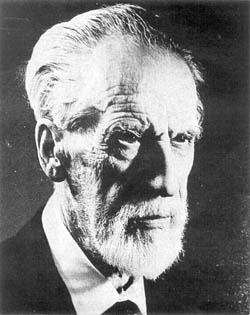
Editor of this issue: A. Mickevičius
 |
www.lituanus.org |
|
Copyright © 1963 Lithuanian
Students Association, Inc.
Vol. 9, No.1 - 1963
Editor of this issue: A. Mickevičius |
|
Professor Mykolas BIRŽIŠKA
(1882 -1962)

The life of Professor Mykolas Biržiška was inseparable from modern Lithuanian history. It was complexly intertwined with the birth of nationalism, the social revolution, the establishment of an independent Lithuanian state, and Lithuanian-Polish relations. It was a synthesis of historical determinism and the idea of the great man in history. Professor M. Biržiška was caught up in the torrents of history and at the same time left his mark upon it; he was a revolutionary, but spent a major portion of his life in scientific endeavor. He represented the reasonable positions and was uncompromising in his moral principles. He came from a prosperous family and fought for social justice. One might describe him as important in Lithuanian history, but it would be difficult to explain his influence to one not engrossed in Lithuanian life.
Mykolas Biržiška was born into a Polish-oriented society, and at the age of eighteen decided to become a Lithuanian. The Lithuanian-Polish Insurrection of 1863 may have been squelched by the Czar, but its aftermath gave birth to new ideas which threatened the existence of the Russian State. When the Czar forbade the use of Latin letters, the German-controlled areas produced writings which for the first time were printed in Lithuanian, and the country secretly read Lithuanian newspapers, Lithuanian prayer books, and other Lithuanian publications. Students who had never been faced with the question of national identity were engulfed by the romantic spirit and proudly announced that they were Lithuanians with a great tradition and history. This, in summary, was the type of world which Mykolas Biržiška entered. In 1900, while in the gymnasium of Šiauliai, Biržiška was born into a Polish-oriented society, and at the age of eighteen decided to become a Lithuanian. The Lithuanian-Polish Insurrection of 1863 may
The Insurrection of 1863 also left deep-seated political and social disturbances. The economic injustices which the Land Reform of 1861 had merely accentuated gave rise to various forms of radical movements. The oppressive measures taken by the Czar encouraged disobedience and rebellion. Mykolas Biržiška, therefore, came into a politically active society. In 1897 he participated in a high school riot against compulsory attendance of Russian Orthodox Church services. In 1900 he organized a group for political education.
After entering law school in Moscow in 1901, he joined the Lithuanian student society. While attending a students' meeting on February 2, 1902, he was arrested and received a two-year sentence. While he was in prison, his radical political views became crystallized.
He had been expelled from the university for his political activity, but was subsequently re-admitted; at that time, in addition to his studies of law and humanities, he began to study Lithuanian literature. During the rest of his university days he eagerly pursued his studies, took an active part in Lithuanian affairs, and continued brushing with the police.
Upon graduation from law school in 1907, he went into practice in Vilnius. This, however, was a secondary endeavor; he devoted most of his time to Lithuanian literature and to other aspects of the life in his country. Until 1914 he wrote for, and edited, various newspapers and participated in various political movements.
When the effects of the first world war reached the country, he joined various organizations to aid victims of the war. Meanwhile, he continued writing articles and books. In 1917 he became a member of the Executive Committee of the Lithuanian Conference. When the Social Democrats demanded that he withdraw from the Committee, he resigned from the Social Democratic party. In December of 1917 the Germans had forced the Committee to sign a declaration of perpetual alliance; in January of 1918, after the Germans refused to supplement this declaration of perpetual alliance with a reference to the national assembly, Mykolas Biržiška and several others tendered their resignations to the Committee.
He subsequently returned to the Committee and on February 16, 1918, was one of the signatories to the Declaration of Lithuanian Independence. When the Committee decided for the establishment of a monarchy, he again resigned.
In December of 1918 he became the Minister of Education and, when the Germans withdrew in January of 1919, he remained as the representative of the government in Vilnius which was then occupied by the Polish forces. After the Communists occupied Vilnius, he was arrested, but later was released and returned to teaching.
Upon the return of the Polish armies to Vilnius, he edited various publications advocating the return of Vilnius to Lithuania Proper, continued teaching, and took an active part in the negotiations between the Lithuanians and the Poles. In February of 1922, when arrested by the Polish government for treason, he escaped death through the intercession of the League of Nations.
He was deported and returned to Kaunas, the provisional capital of Lithuania. There he worked as an editor, later became a professor at the University of Kaunas, and subsequently Dean of the Division of Humanities. In 1925 he became the Pro-rector, and in 1926 he was appointed Rector of the University. During that period he traveled widely as a representative of the University and of the Lithuanian Government. From 1932 on he was also an associate editor of the Lithuanian Encyclopedia.
Second World War started. During the German occupation he was the Rector of the University of Vilnius. In 1944 he fled to Germany and taught at the Baltic University after the end of World War II. Upon his arrival to the United States, he participated in editing the Lithuanian Encyclopedia and continued his writing in Los Angeles, California, until the date of his death - August 24, 1962.
G. G.